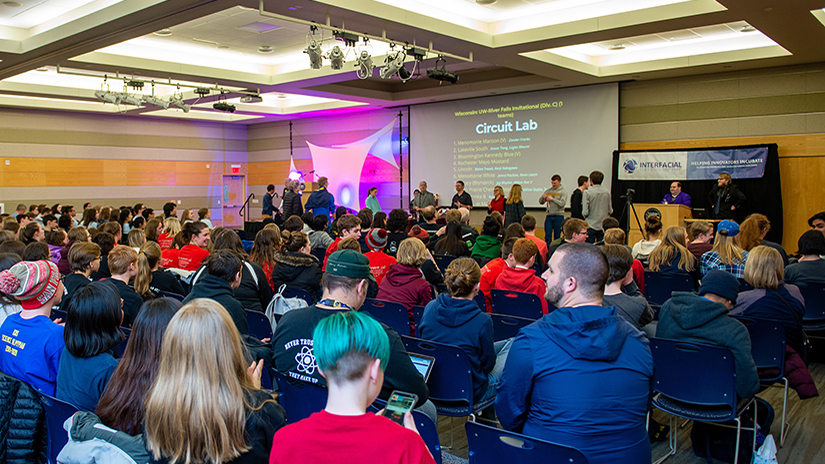
About 900 students from Wisconsin, Minnesota and other Midwestern states will compete in the Science Olympiad event at UW-River Falls on Saturday, Jan. 20. The event is affiliated with the national Science Olympiad organization and is designed to increase interest in science and recognize scientific achievement. UWRF file photo.
Event to include about 900 high schoolers from across the Midwest
When about 900 high school students on 58 teams from Wisconsin, Minnesota and elsewhere across the Midwest convene at the University of Wisconsin-River Falls on Saturday, Jan. 20, they will exhibit their knowledge of and affinity for all things science.
Those students will take part in the Science Olympiad, a competition hosted each winter at UW-River Falls in conjunction with the university’s science programs. This year’s event marks the 12th Science Olympiad the university has hosted.
Earl Blodgett, UWRF emeritus physics professor, organized the first Science Olympiad at the university in 2012. In subsequent years the number of participants grew, a sign of the continued recognition of the important role science plays in society, he said, and of student interest in science-related fields.
The competition was interrupted because of the coronavirus pandemic, but participation is bouncing back, Blodgett said. Each team has up to 15 members.
“This event is all about sciences of all sorts,” he said. “It’s about celebrating the sciences and getting students to be enthusiastic about science, to get them to think about science in new ways and to dig a bit deeper.”
Science Olympiad is an international nonprofit organization created in 1984 to improve the quality of science education by increasing student interest and recognizing outstanding scientific achievement. Science Olympiad tournaments like the one at UW-River Falls are regional competitions where students can qualify for state and national events.
High schools across the country compete in tournaments, which are designed to be rigorous. The events include a wide range of sciences in which students are tested, ranging from biology and earth sciences to chemistry, physics and technology. High school and college teachers design competition questions which are overseen by national Science Olympiad officials.
“These events are designed to be really hard,” Blodgett said, “so that they would be challenging even for a college junior or senior. The kids go into this knowing it is going to be really tough.”
While Science Olympiad is challenging, students step up to the challenge, Blodgett said. The event is intended to foster critical thinking skills and teamwork, he said.
“This event often covers concepts and ideas that students don’t typically see in their classrooms,” Blodgett said. “We really want to see students to use their critical thinking, communication and observational skills.”
Science Olympiad events at the UW-River Falls competition will occur at numerous campus locations. Blodgett and Jamie Schneider, UWRF chemistry professor who is tournament director of this year’s Science Olympiad, will work with a team of volunteers to coordinate many events happening simultaneously.
To prepare for the event, Schneider visited other Science Olympiad competitions. For the first time, this year’s event at UW-River Falls will include a resource fair designed to provide competitors with information about the university.
“This is a chance for those students to see our university, to get a feel for what it’s like here,” Schneider said. “We want to provide them with as much information as we can with the hope that maybe they will decide to attend college here.”
The event can certainly serve as a recruiting tool, Blodgett said, and a way to highlight the strong science programs at UW-River Falls. In addition to its focus on science, the event also showcases the joy of science, he said.
“When you see students work hard to come up with an answer, when they learn a new concept, and you see how much they enjoy it, those are the moments when you say, ‘this really works,’” Blodgett said.
Written by
Link to original story:
